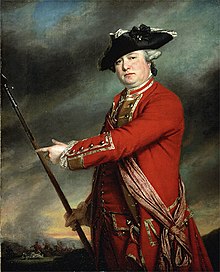Francis Smith (British army officer)
| Francis Smith | |
|---|---|

Francis Smith in 1763. Painted by Francis Cotes
|
|
| Born | 1723 |
| Died | 1791 (aged 67–68) |
| Allegiance |
|
| Service/branch |
|
| Rank | Major General |
| Battles/wars | |
Major General Francis Smith (1723–1791) was a British army officer. Although Smith had a lengthy and varied career, he is best known as the British commander during most of the Battle of Lexington and Concord, Massachusetts on 19 April 1775. The fighting ignited the American War of Independence that would see Thirteen of Britain's American Colonies become a separate nation.
Smith was Lieutenant Colonel of the 10th Regiment of Foot. He was given overall command of the expedition to Concord, which consisted of twenty one companies of Light infantry and grenadiers totalling around 700 men, whose orders were to search the town for contraband supplies and weapons, particularly artillery. General Thomas Gage believed that the mission required a force larger than a regiment but smaller than a brigade and so assembled it by taking individual companies from the various units in Boston. This left Smith's force lacking a proper command structure or staff.
As the crisis in Massachusetts had intensified during late 1774 and early 1775, a number of British expeditions had marched into the countryside to search towns where it was believed weapons and supplies were being stored while other units took part in a series of rapid route marches through the countryside to keep the troops physically active. Several minor confrontations and stand-offs occurred during these months, such as the Salem Incident, but had ended without bloodshed. Gage anticipated that Smith's march to Concord would be similar to these earlier expeditions and was unlikely to come under attack. The vast majority of the colony's inhabitants considered themselves loyal Britons and apart from a handful of hard-liners on both sides there was a strong desire to avoid the upheaval of civil war.
...
Wikipedia
